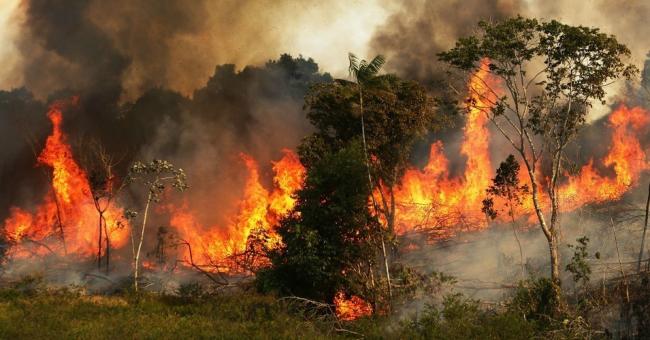Articles Menu

While healthcare providers and government officials around the world work to slow the spread of the coronavirus pandemic and mitigate the effects of a resulting economic crisis, scientists urged authorities to also seriously consider a long-term strategy for preventing another infectious disease outbreak—calling the coronavirus a "clear warning shot" from nature.
Previous warnings—taking the form of the Ebola epidemic of 2014, the SARS outbreak in 2002-2003, and MERS in 2012—have gone unheeded, U.N. Environmental Program director Inger Andersen said Wednesday
"Never before have so many opportunities existed for pathogens to pass from wild and domestic animals to people," she told The Guardian, thanks to widespread habitat destruction through deforestation, mining, exploitation of animals for profit, and the climate crisis.
"Our long-term response must tackle habitat and biodiversity loss," Andersen said.
Wildfires throughout Australia and Brazil—with the latter linked to President Jair Bolsonaro's administration in the interest of ranching and agribusiness interests—rising global temperatures brought on by fossil fuel extraction, and other extreme weather caused by the climate crisis are all to blame for a loss of "wild spaces," Andersen said.
This "continued erosion," she told the outlet, "has brought us uncomfortably close to animals and plants that harbor diseases that can jump to humans."
"We are intimately interconnected with nature, whether we like it or not. If we don't take care of nature, we can't take care of ourselves."
—Inger Andersen, U.N. Environment Program
With 75% of infectious diseases originating from wildlife, Andersen and other experts said, increased demand for animal products around the world could be putting humans at risk for outbreaks like the coronavirus pandemic.
The coronavirus, officially known at SARS-CoV-2 or COVID-19, is thought to have spread from a species of horseshoe bat to another animal in a live animal market in Wuhan, China, allowing it to spread to humans.
"The origin and pathway of the coronavirus pandemic shouldn't surprise us," World Bank environmental specialist Daniel Mira-Salama wrote last week. "The SARS epidemic in 2003 jumped to humans from civet cats, sold in markets as pets and as a delicacy. MERS was transmitted to humans from camels in 2012. Avian influenza, Nipah virus, Ebola, HIV… all of these and many other Emerging Infectious Diseases (EIDs) originated in animals and were transmitted to humans—a phenomenon called zoonosis."
Ending illegal animal trades would help cut down on the spread of infectious diseases in markets, which the experts called an "ideal mixing bowl," according to The Guardian.
"We should be taking this as a clear warning shot," Professor Andrew Cunningham of the Zoological Society of London told The Guardian. "It's almost always a human behavior that causes it and there will be more in the future unless we change."
A global governmental effort similar to the concrete, far-reaching government reforms to stop the climate crisis demanded by Greta Thunberg and other campaigners around the world is needed to face "the deadly impacts of collapsing ecosystems," Irish Wildlife Trust campaign officer Pádraic Fogarty tweeted.
While President Donald Trump has claimed numerous times that COVID-19 "came out of nowhere" and is a crisis that "nobody expected," its emergence and spread was "not only predictable, it was predicted," Cunningham told The Guardian.
Scientists have warned for years that "there would be another viral emergence from wildlife that would be a public health threat."
Humans, particularly those in positions of power, the experts said, must now face the consequences of their appetite for illegal animal trades, extractive industry profits, and other profit-driven activities which lead to the destruction of animals' habitats around the world. Once the coronavirus pandemic is over, there must be a new focus on protecting biodiversity and wildlife.
"We are intimately interconnected with nature, whether we like it or not," Andersen said. "If we don't take care of nature, we can't take care of ourselves. And as we hurtle towards a population of 10 billion people on this planet, we need to go into this future armed with nature as our strongest ally."
[Top photo: A fire burns trees next to grazing land in the Amazon basin in Ze Doca, Brazil. (Photo: Mario Tama/Getty Images)]